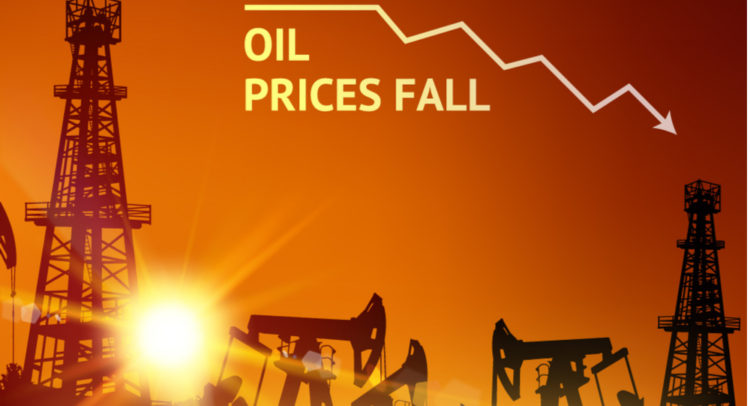After witnessing almost decades of high prices in March 2022, oil prices witnessed a 10% plunge on Tuesday, with the West Texas Intermediate (WTI) trading near $97.43 per barrel. The benchmark U.S. oil indicator closed down 8.24% at $99.50 per barrel, while Brent Crude closed down 9.45% at $102.77 per barrel.
Invest with Confidence:
- Follow TipRanks' Top Wall Street Analysts to uncover their success rate and average return.
- Join thousands of data-driven investors – Build your Smart Portfolio for personalized insights.
The daunting fears of a recession are dampening the demand for oil and gasoline and pulling down the prices. It is typical for oil prices to recede in times of a steep economic downturn.
Meanwhile, Wall Street research firms have contradictory stances on the oil price trajectory. According to a Citigroup report, should a recession befall, Brent prices could hit a low of $65 per barrel by the end of 2022 and could also hit $45 per barrel by the end of 2023. However, the report also suggests that they do not expect the U.S. to enter a recession anytime soon.
Meanwhile, Goldman Sachs expects oil to reach $140 per barrel during the summer, as told to CNBC last week. The firm sees the current dip in oil prices as a buying opportunity. Similarly, JP Morgan has also projected that oil prices could skyrocket to $380 per barrel should Russia start cutting crude oil production in response to the extreme sanctions on the invading country.
Oil company stocks also dipped yesterday with the falling oil prices. Shares of the world’s largest oil producer, ExxonMobil (NYSE: XOM), fell over 5%, and hydrocarbon exploratory company Diamondback Energy (NASDAQ: FANG), slipped over 8%.
Exxon to Exceed Expectations
Gaining from the rising oil prices and higher oil-refining margins, Exxon Mobil said on Friday that it expects to register historic profits in the second quarter results scheduled for July 29, with the earnings consensus pegged at $3.27 per share.
As per a regulatory filing, Exxon expects changes in liquid oil prices to boost Q2 profits by $1 billion to $1.4 billion and changes in gas prices to add between $1.5 billion and $1.9 billion to profits. Moreover, changes in industry margins could add another $4.6 billion to its profits.
Following the disclosures, Wells Fargo analyst Roger Read reiterated a Buy rating on the stock with a price target of $109, which implies 28.5% upside potential to current levels.
Read calculates that, based on the midpoint estimates of these changes, Exxon could earn a net income of nearly $17.9 billion, or $4.09 per share, with the higher end projected at $19.5 billion.
Similarly, Credit Suisse analyst Manav Gupta reiterated a Buy rating on the stock with a price target of $125, implying 47.4% upside potential to current levels.
Gupta believes that XOM’s latest disclosures could mean that its Q2 would surpass prior peak levels by a wide margin, making it the strongest quarter to date.
Overall, the stock commands a Strong Buy consensus rating based on ten Buys and three Holds. The average Exxon Mobil price target of $105.82 implies 24.8% upside potential to current levels. Meanwhile, the stock has lost 36.3% so far this year.

Diamondback Will Shine in Q2
Diamondback Energy, an independent oil and gas producer, is scheduled to report second quarter earnings on August 1, after the market closes. FANG stock has gained almost 5% so far this year.
While some oil and gas companies are focused on reinvesting any excess returns generated during the current boom period, Diamondback has decided to continue increasing its shareholder returns.
On June 21, the company disclosed that it had enhanced its capital return program to include its return of capital commitment of at least 75% of free cash flows.
Moreover, it also intends to increase its base dividend to $3 per share annually beginning in Q2, reflecting a current yield of 2.6%. The company also continues to buy back common stock under its opportunistic share repurchase program.
Recently, Citigroup analyst Scott Gruber lifted the price target on FANG stock to $148 (29.7% upside potential) from $145, while maintaining a Buy rating.
Similarly, RBC analyst Scott Hanold increased the price target on the stock to $184 (61.2% upside potential) from $180, while maintaining a Buy rating.
With 18 unanimous Buys, the stock commands a Strong Buy consensus rating. The average Diamondback Energy price target of $186.33 implies 63.3% upside potential to current levels.

Ending Notes
Despite the near-term oil price volatility, oil and gas companies are expected to report solid results for the June quarter on the heels of elevated oil prices and better margins. Notably, analysts are bullish on the long-term trajectory of both ExxonMobil and Diamondback, making them lucrative investment options.









